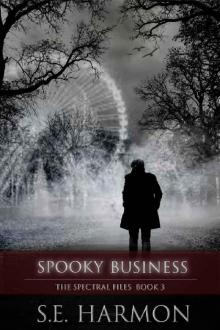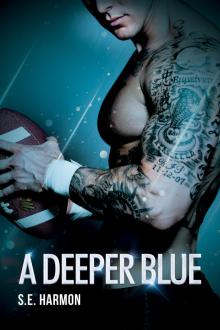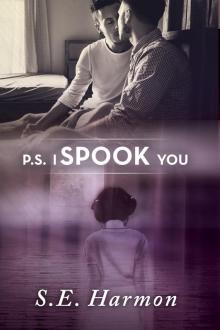- Home
- S. E. Harmon
P.S. I Spook You Page 4
P.S. I Spook You Read online
Page 4
Kevin St. James, Danny’s partner, was already seated at his excuse for a desk, demolishing something wrapped in a soft tortilla and aluminum foil. His desk was closest to Danny’s, which gave him a twenty-four/seven, three-sixty-five view of Kevin eating his weight in junk food. Probably because his wife didn’t allow him to eat any junk at home. I glanced at the picture on the corner of the desk—three kids, all blond and blue-eyed as their father, the littlest grinning with a gap-toothed smile.
Kevin finished the burrito and crumpled the foil, which he then pretended to jump shoot at the garbage can. “He’s open for the shot. He shoots!”
“Brick,” I said as the ball bounced off the rim. I shook my head when he started in on the bag of fried plantains. “I’m trying to remember the last time I didn’t see you eating, and I’m coming up blank.”
At six five with a muscular frame, there was plenty of room for the food to go. He’d developed a little bit of a belly since the last time I’d seen him, but that was probably due more to age than anything else. “I have a fast metabolism.” Kevin shrugged, blue eyes dancing. “And we can’t all look like we stepped out of a magazine.”
“St. James. I knew I’d forgotten something on my ‘things I hate about Miami’ list.” I pretended to think. “I’m going to put you down right between the blazing hot sun and no free parking.”
He grinned. “Good to see you, Christiansen. You here to show us how the big boys in Quantico do it?”
I had to grin back. “Of course, Mayberry.”
The door opened just then and Danny came in, a box of donuts in one hand and a mug of coffee in the other. He looked more appropriately dressed for Vice than anything else, clad in black jeans that were a little too faded and tight and a black shirt with a rock logo on the front. His dark hair was tousled, and it was clear he hadn’t bothered with a shave. I knew he mostly did it to needle his lieutenant, who preferred her detectives to look like they’d stepped out of that Dick Tracy movie. But Danny looked his best between scruffy and tailored.
He stopped short to see me, briefly nonplussed. “You’re here.”
“I am,” I agreed.
“Well, good. Okay.” Just like that, he was back on track. Quick recovery. That was Danny. In bed and out. “They bring you up to speed?”
“I just got here. What’ve we got?”
Kevin snagged a donut and sank his teeth into it. “It would be easier to tell you what we don’t have. Motive. Witnesses. A suspect. A clue.”
Danny sent him a warning look and set the box on the edge of his desk. “Amy Greene was last seen on March 25. She left Roosevelt High after school in a 1995 Toyota Camry that belonged to her mother, Dinah Greene. She headed to McDonald’s, where she bought food and a beverage. She ate in her car while talking on the phone with her best friend, Jenna, and then headed to a Citgo station where she worked as a part-time clerk.”
“What time was her shift?”
“Five to nine fifteen p.m. She was usually home by ten. There’s video surveillance of her car leaving the parking lot at nine thirty. Then she vanished.”
It all sounded pretty much like the information I’d read that morning. “Anyone following her?”
“Not that surveillance cameras could pick up. We have footage from both the station she worked at and the drive-through across the street. It’s a little grainy, but it’s definitely her car.”
“Have you checked out the family?”
“The stepfather is a local mechanic—one of those big-chain lube jobs. His alibi is solid. The mother is at home on disability. Back problems, I think. Three younger brothers live at home, all under ten.”
“I notice you’re tap-dancing around the obvious.”
“Well, we’re still eliminating the boyfriend.”
“I meant the fact that she could have just walked off on her own.”
“That’s still a working theory,” he admitted. “But her bank account wasn’t touched. Seventeen hundred dollars.”
“Is anything missing from her room?”
He hesitated just long enough for me to realize he didn’t want to tell me. Finally he said, “Her purse. Laptop. Violin.”
“All things she would’ve taken to school.”
“And her suitcase.”
“McKenna—”
“Which she often used to carry art projects to school. From all accounts she seemed to be happy and well-adjusted. Lots of friends.” Danny scowled at my silence. “Good grades. She was college bound.”
“Things aren’t always as they seem.”
“And sometimes they are.” He looked at me darkly. “Right now we’re treating it as a missing-person case.”
I held up my hands, as though disagreeing were beyond me. “Of course. You’re the lead.”
He eyed me suspiciously, like he couldn’t believe I was acquiescing so easily. “We’ve cleared a desk for you, if you need a place to work.”
I nodded, but he’d already turned. Dismissed, serf. I resisted flipping his back the bird and began to cart materials over to the empty desk, grateful I wouldn’t have to sit at the group table. I don’t know whether it was carryover because I grew up in a sharing community or that I’m finicky, but I didn’t like people touching my things.
I laid out my files neatly, chronologically. By the time I finished, I could hear discord on the other side of the room. Lots of discord. A half partition wall made of cork and good intentions did little to cushion it.
“…is he even doing here?” Gonzalez was apparently resisting Tabitha’s efforts to hush him.
“…an asset to the team” came Danny’s deeper voice. He sounded icy. “He’s just here to help.”
“We don’t need that kind of help.”
“What the hell is that supposed to mean?”
“It means I heard he cracked up.” Gonzalez’s voice had gained strength. I could hear every word. “He went crazy up there and started talking about ghosts and shit.”
My face burned. I knew it was too much to hope those rumors hadn’t made the rounds. Gonzalez clearly wasn’t finished. “The doc can’t decide if he wants to be from Criminal Minds or Ghost Whisperer.” He snorted. “Solving crimes is not about crystal balls and tarot cards. Solving crime is about hard work—police work.”
“Stuff something in that crater-sized mouth of yours, would you?” Kevin whispered. “He’s going to hear you.”
“Good,” Gonzalez snapped. “Maybe he can tell us why, exactly, we need his kind of help.”
“Well, I make a mean pot of coffee,” I said, finally tired of being talked about. I rounded the partition to absolute silence. “I can see why you’d be skeptical, but profiling does have its place in locating missing persons.”
Danny frowned. “You don’t have to explain yourself to—”
I waved a hand and cut him off. “It’s fine. I get this a lot.” Too much, really. Some people just couldn’t grasp the fact that we were on the same team. “When you have a missing person, there are always going to be a variety of unspoken variables. Was she a victim of foul play? Is she an attempted or completed suicide? If she did run away, is she likely to return home on her own? Runaways, suicides, and victims of foul play have unique profiles that not everyone is trained to assess.”
Gonzalez bristled. “We’re working this case the best we can.”
“Of course. The general procedure for a missing person requires that we collect information from next of kin, friends, coworkers, and acquaintances, and I have no doubt that you’ve done that. But profiling can determine who that person really is… almost like a psychological autopsy. An extension of victimology that reconstructs the psychological state leading up to the disappearance. That’s the only true way to get a full picture of her lifestyle risk. Was she low or high risk? From all appearances, she seemed to have a routine that she followed, and a consistent set of friends that she came in contact with. No drugs. No prostitution.”
“Low-risk lifestyle,” Tabitha sai
d with a nod. “So who’s she a target for?”
“High-risk lifestyle equals unknowns. Low-risk? It’s more likely she was victimized by someone close. Someone she’d open the door for late at night. Someone who could ask her to come over and she wouldn’t bat an eyelash. In other words the worst kind of betrayal.”
“Family members,” she agreed. “Boyfriends. Teachers.”
“I won’t take you through any of the chi-square analyses or data-mining procedures, but it basically amounts to eliminating a litany of variables. Demographic. Social. Circumstantial. Then cross-comparing them to personality and behavioral factors. So that’s how I might be able to help.” I shrugged, and my gaze bounced from Kevin’s grinning face to Gonzalez’s red one. “And like I said, I did make coffee.”
Danny looked fairly amused. “I guess that ends the introduction portion of our morning. Gonzalez, Tab, weren’t you guys supposed to be meeting with the aunt?”
“We’re on it.” She reached over, grabbed two donuts, and stuck one in Gonzalez’s mouth. She patted him on the top of the head. “Just in case you get the urge to say something to actual people again.”
Kevin pushed back his chair and stood. “I spoke with the school counselor this morning. She’s available to meet with us at noon.”
“Dr. Christiansen and I are supposed to meet with the mother,” Danny said.
“You guys should go.” Kevin snagged another donut. “I can handle the school interview on my own. Besides, I think two detectives and a buttoned-up G-man is a bit much for a friendly interview anyway.”
I looked down at my attire. “Buttoned-up G-Man?” Maybe it was the pinstripe vest.
Danny just smiled.
I WAS glad my new desk was situated near a window, seeing as how I was clearly going to be spending a lot of time sitting on my ass, reading dry files. I spent the next few hours orientating myself with all things Amy Greene. I also ate quite a few more donuts than I should’ve—fuck, I was already feeling more like a cop—and made notes on my iPad with slightly sugary fingers.
Case 38419AG started with that photo of Amy, the same one I’d seen before—a yearbook photo. All I could see of her clothing was a ribbed blue turtleneck. Her long auburn hair fell in natural waves around her shoulders. Dark brown eyes surveyed me solemnly in a face slightly too long and thin to be called beautiful. She’d disappeared five years ago, though. Those slightly awkward features just this shy of symmetrical had probably matured with adulthood.
If she was still alive.
I made a quick note to send her photo to the lab for an age progression and kept reading. She was the only girl child of Dinah Ryan and an unnamed father. When Amy was four, Dinah had married a man named Luke Greene, and over the next few years, had three sons—now ten, nine, and four years of age.
I flipped past the initial information and got to the meat of things. Apparently Amy usually arrived home no later than ten p.m. Her mother began to call all her friends by eleven thirty, while her stepfather went to the gas station to look for her. They looked until midnight and then decided to call the police. Previous investigators summarized that she willingly left her job that day, under her own steam, in her own vehicle.
Just the verbiage made me grit my teeth. Willingly. Own steam. It was in my nature to question everything and everyone, and to my trained eye, it seemed like the primary detectives had viewed her as a runaway case. A nuisance case. I’d admit that it was a possibility, but it was just that—a possibility.
At least they pulled out all stops for a search. They did a four-mile grid search that they later expanded to six. Dogs, CSU, the whole nine. There was a big family effort too—posters, vigils, several local news appearances, and a ten-thousand-dollar reward posted with church donations. There had been several hundred tips, but none of them had panned out. I frowned. “See Annex C1” was underneath the tips section.
My eyes widened as I spotted a binder in the box labeled C1. It was thicker than the old-school yellow pages. I’d have to go through that later, and I wasn’t looking forward to it. Most of that information would be garbage. Like digging through millions of oysters to find the one with the pearl.
I set the binder aside and flipped through the case reports—copious interview notes from the various people in Amy’s life. The boyfriend, Brock Johnson. An alibi-confirmation report stating that the boy’s mother had confirmed he was home by nine the night Amy disappeared. I snorted. An alibi from someone’s mother was almost like no alibi at all.
There were interview notes from Amy’s coworkers. Classmates. Neighbors. Over two hundred pages of documents and photos, two years of investigation, and they’d turned up nothing. The case had turned cold. I hated that term.
Cold.
It was only cold to the people who didn’t really know the victim. I’d bet it wasn’t cold to her mother. Her brothers. For the people who’d loved and known Amy Greene as more than just case file 38419AG, the case was probably far from cold.
“Well, we’re not ready to give up quite that easily,” I murmured.
“What?”
I glanced up to find Danny with a fast-food bag in his hands. “Just thinking out loud. Is that for me?”
“Yep. It’s noon.”
I checked my watch, almost automatically, and grimaced. “Damn. I didn’t realize it had been that long.”
“You’re being thorough. That’s a good thing.” He set the bag on the table and dropped into one of the chairs. “I’m thinking we can head out in about an hour.”
“Dinah Greene.” I thought back to the photo of the badly aging blonde. “Is she receptive?”
He nodded. “Seems to be. The stepfather isn’t quite as agreeable.”
“Stand-up kind of guy?”
“Kind of a douche, actually.” Danny shrugged. “But he’s a douche with a fairly credible alibi. He’s a regular at a local bar, and he was there that night during the window of her disappearance. Several people vouch for him.”
“Credible people?”
“As far as barflies go.” He pushed the fast-food bag closer to me. “Eat up and then we can go.”
“I’ve eaten already.”
“Donuts are not food,” he countered.
I stared at him then, struck by memories of him doing the exact same thing. Before. When we… when we were. When I hadn’t left, and he and I were an us. When I pushed him away, and he didn’t push back.
When I was offered an opportunity to join Graycie’s team in DC, I was hesitant. But it was a step up from my previous position, and the pay was decent.
Even now I don’t know if I was testing Danny when I told him about it. He went completely still, and those usually expressive eyes were unreadable. He came closer to me then, his voice deep and husky. “This what you want?”
I swallowed hard. “It is.”
It seemed like the right thing to do when I saw ghosts every time I turned around. Seemed like the right thing to do when I was pretty sure I was losing my mind. I’d seen the hurt in his face then. He wasn’t able to hide it. And then his final word on the subject. “You should take it,” he said. So I did.
We’d agreed to stay friends. Whatever the hell that means. It never worked like it was supposed to, and we were no different. A few calls a year tapered off into the occasional birthday text, and that turned us into what we were by then—strangers.
“Rain?”
I blinked at him and realized I’d been staring and hadn’t spoken for quite some time.
“Yeah.”
“You okay?”
I would be.
I cleared my throat. “Thanks for the food.” I opened the fast-food bag and pulled out some fries. I went back to the murder book and read as I ate. “I’ll be ready in an hour.”
Chapter 5
DISREPAIR. BAD shape. Broken-down.
All terms that filtered through my mind as Danny parked on the Greene’s overgrown lawn.
Crack house.
All righ
t, maybe not the last one. But the entire house was a mosaic of shabby, from the top of the gabled roof, which was steadily shedding tile, to the chipped and broken walkway that hugged the house as though to protect it from harm. Even the gabled front window, which should have been the showpiece of the Victorian-style house, was covered with a wooden board.
“Maybe we should revisit that runaway option again,” I said as I eyed the shambles. I certainly wanted to get as far away from the place as I could.
“Could you at least try to look less disgusted?” Danny pressed a button on the remote and the alarm chirped. “Not everyone grows up with a silver spoon in his mouth.”
I scowled. “This is not about wealth. My parents weren’t exactly rolling in it. In fact we weren’t even allowed to take the bus because my father had an aversion to the… let me see if I can quote him correctly—fat-cat oil tycoons stripping and selling out the milk of the Earth.”
His mouth twitched. “Sounds like your dad.”
I shook my head. “Which brings me back to my point. I’m not spoiled. This is just… filthy.”
“We haven’t even seen the inside yet.”
Even the dingy siding was slightly beige and in need of a good whitewash. “I’m going to make a wild guess. More of the same?”
“Not our problem.”
We wound our way around the four cars in various stages of decomposition on the weed-eaten lawn. There was a reindeer statue in the front yard for no reason I could discern. From the looks of things, they dressed the animal according to the holiday, so he wore a pointy witch’s hat. The poor thing looked embarrassed.
As we mounted the porch, my disgust grew. Junk covered the porch end to end—old bottles, cartons, a small child’s rocking chair, an empty gasoline container. It was like a garbage truck had been on its way to the dump and decided good enough.
I sent Danny a sideways look. “You know they have children here.”
“Not. Our. Problem.” He set a finger to the bell and gave me the hairy eyeball. “If there are signs of neglect, we can alert children’s services. Until then, just hush.”

 Spooky Business
Spooky Business A Deeper Blue
A Deeper Blue Love Is
Love Is Principles of Spookology (The Spectral Files Book 2)
Principles of Spookology (The Spectral Files Book 2) P.S. I Spook You
P.S. I Spook You